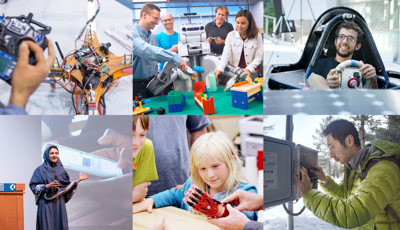Zhaojun Bai is a Professor in the Department of Computer Science and Department of Mathematics, University of California, Davis, and a Faculty Computer Scientist at Lawrence Berkeley National Laboratory.
UC Davis
UC Davis is renowned for cross-disciplinary research and teaching that draw upon 100 academic majors; 87 graduate programs; and professional schools in business, education, law, medicine, nursing, and veterinary medicine. The campus connects the population-dense San Francisco Bay and Sacramento urban areas, natural resources in the Delta and the Sierra Nevada, and Central Valley agriculture. CITRIS and the Banatao Institute, UC Davis brings expertise in engineering, nanoscience, law, and medicine to bear on complex challenges related to food, health, the environment, and society.
Just north of campus at the UC Davis Health System in Sacramento, the Center for Health and Technology and the Center for Virtual Care improve the quality of healthcare through education, training, and specialty care services. This 52,000 square-foot joint facility offers HD-equipped classrooms, four telehealth training exam rooms, an inpatient room, outpatient clinic, and a technology demonstration suite. The Center for Virtual Care features a full-size emergency room trauma bay, operating room, inpatient unit, six-bay simulation education area, exam rooms, and sophisticated training mannequins. The adjacent media production studio makes on-site development and distribution of instructional media possible. These advanced training centers connect UC researchers and practitioners with remote clinics across the state of California, enabling the delivery of life-saving care and innovative IT solutions.
Contact CITRIS and the Banatao Institute, UC Davis
CITRIS and the Banatao Institute, UC Davis on Facebook
Oliver Staadt
Oliver Staadt is an Assistant Professor of Computer Science at the University of California, Davis. Prior to joining UC Davis, he has been Senior Research Associate in the Computer Graphics Lab at ETH Zurich, Switzerland. He received a MSc degree in Computer Science from the Darmstadt Technical University, Germany, in 1995 and a PhD in Computer Science in 2001 from the Swiss Federal Institute of Technology (ETH) Zurich, Switzerland. His past research includes multi-resolution representations and compression of surface and volume data.
Professor Nelson Max
Professor Max’s research interests are in the areas of scientific visualization, computer animation, and realistic computer graphics rendering. In visualization he works on molecular graphics, and volume and flow visualization, particularly on irregular finite element meshes. He has rendered realistic lighting effects in clouds, trees, and water waves, and has produced numerous computer animations, shown at the annual Siggraph conferences, and in Omnimax at the Fujitu Pavilions at Expo ’85 in Tsukuba Japan, and Expo ’90 in Osaka Japan.
David Horsley
Dr. David Horsley is a Professor in the Department of Mechanical and Aerospace Engineering at the University of California, Davis, USA, and has been a co-director of the Berkeley Sensor and Actuator Center (BSAC) since 2005. His research interests include microfabricated sensors and actuators with applications in optics, displays, and physical and biological sensors.
Ben Yoo
CITRIS at UC Davis Director Emeritus
University of California System and Indian Scientific Organizations Ink Landmark Agreement on Global Research
A recent landmark agreement increases the collaboration between the University of California System, including CITRIS, and leading Indian scientific organizations and universities, to a far deeper level in areas of science, technology, research and education. More
$20K CITRIS competition for student ideas
CITRIS is sponsoring a $20K "white paper" competition that is open to teams of undergraduate and graduate students from all 4 CITRIS campuses (Berkeley, Davis, Santa Cruz, and Merced). Papers are due May 1, 2006. More
CITRIS Feature Article
CITRIS researcher champions hydrogen as an alternative to oil in California




